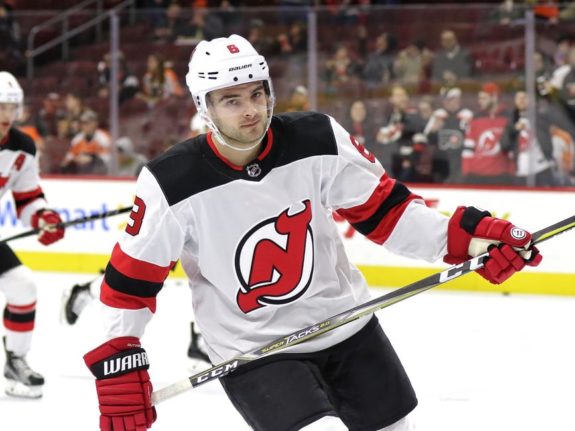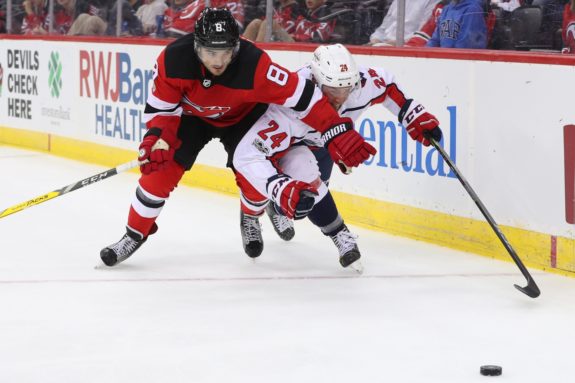![]()
Will Butcher was one of general manager Ray Shero’s prized free agent signings as New Jersey Devils’ GM. After opting to not sign with the Colorado Avalanche out of college, Butcher signed with the Devils in Aug. 2017 as an unrestricted free agent (UFA). He finished with 44 points in 81 games, the most for a Devils rookie defenseman since Scott Niedermayer in 1992-93.
The hope was Butcher would continue that this season, but there have been some bumps in the road. His points totals are down — he has 17 points in 47 games, which puts him on-pace for 29 — but he still has strong underlying numbers. So why does it seem like his development has stagnated?
Butcher’s Ups and Downs
Butcher was one of the Devils’ strongest five-on-five players in 2017-18. He finished with a Corsi For (CF%) of 53.2 percent and an expected goals for (xGF%) of 55.5 percent, both of which ranked best on the team. He did so while in a sheltered, third-pair role with Ben Lovejoy to form one of the Devils’ more productive defense pairs.
Not much has changed in 2018-19. Butcher’s ice time has increased by over three minutes, but he’s been alongside Lovejoy most of the time. Although Butcher has seen a bump in ice time, Devils head coach John Hynes still limits his defensive assignments. He has the lowest defensive zone start rate and the highest offensive zone start rate of the team’s defensemen, so he still has to earn Hynes’ trust.

As far as his underlying numbers, Butcher remains one of the Devils top five-on-five players — he has an xGF% of 53.9 percent and a CF% of 52.1 percent. While his shot rates remain some of the best, his production has fallen quite a bit since last season. He has five points at five-on-five and is only averaging .43 points per 60 minutes (P/60), which is a substantial drop from the .97 P/60 he averaged in 2017-18.
His production has also fallen on the power play. Butcher was one of the top point-producing defensemen in 2017-18, when he averaged 6.46 P/60. He’s still creating offense while up a man, but his P/60 has fallen to 3.93. There are a couple of reasons for this, one being the Devils’ power play is not very good. The second being Taylor Hall has missed time with an injury. It doesn’t help when your best player isn’t available to help create much-needed offense.
Butcher Due for a New Contract
Butcher will be a restricted free agent this summer, so a new contract is in the cards. There’s plenty of hockey left to be played, but it doesn’t appear he’ll hit his totals from a season ago. How that affects contract negotiations remains to be seen. But for argument’s sake, let’s say he finishes with the 29 points he’s on-pace for. Would that hurt or help him?
The reality is that points aren’t a great way to evaluate a defenseman’s performance. Butcher has strong shot rates and has been effective in his role, so that’s something to consider. His situation is similar to that of Damon Severson’s from two seasons ago.

Severson is in the second year of a six-year, $25-million deal he signed in the summer of 2017. I think the Devils would be smart to look at his deal as a starting point for Butcher. Like Butcher, Severson excelled when in the right role and had success at five-on-five.
Severson’s deal runs until he’s 29 years old, so the Devils also eat a couple of UFA years. Butcher turned 24 on Jan. 6, so a deal that runs for five or six seasons would eat up some of his UFA years, too. Money won’t be an issue for the Devils, but Severson has a pretty reasonable cap hit of $4.025 million per season. Butcher may have more upside, so a cap hit in that range will benefit the Devils down the road.
Related: Butcher’s Rookie Season Proves He Was a Steal
Has Butcher Progressed or Regressed?
It’s a bit of a difficult question to answer, but Butcher hasn’t taken a step back in his second season. That said, it’s hard to say he’s taken a significant step forward. For the most part, the Devils have used him in a similar role to last season. He’s played against slightly harder competition, but his results — aside from the points — are more or less the same as last season’s.
For Butcher to take that next step forward, he’s going to have to face harder minutes. Hynes has used him in a top-four role with Sami Vatanen on occasion, as was the case before their bye week. The Devils aren’t going anywhere this season, so it makes sense to continue testing him the rest of the way.
There’s no question Butcher has to improve his defensive game. He’s only 5-foot-10 and 190 pounds and it’s presented some problems for him. Smaller defensemen are having success in today’s NHL (Ryan Ellis and Jared Spurgeon to name a couple). Butcher still has a ways to go before reaching the level of Spurgeon or Ellis, but he’ll only go as far as the Devils let him. Otherwise, they’ll continue to impede his progress.
* * *
Advanced stats from Corsica Hockey